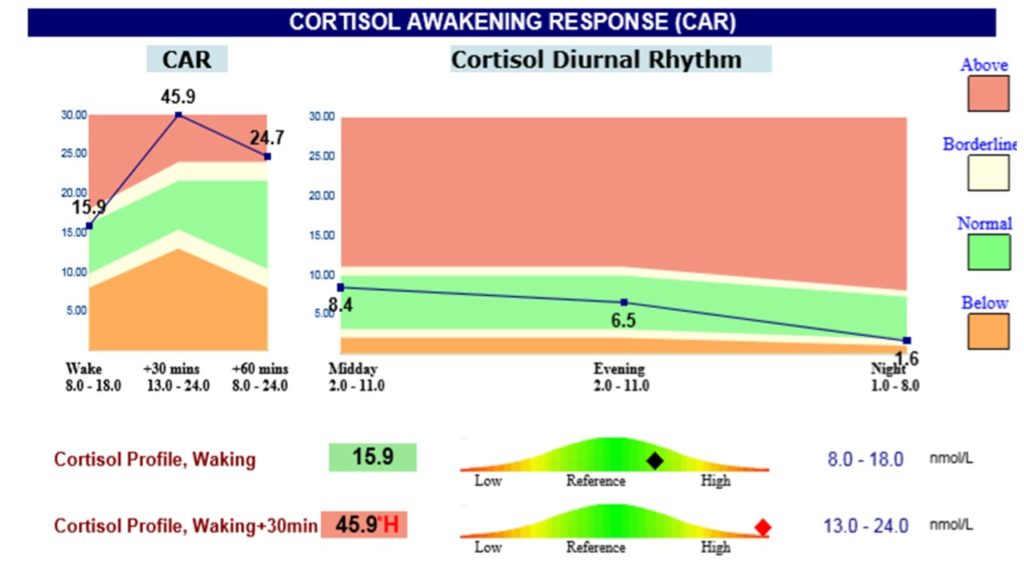Adrenal Fatigue Treatment, Symptoms and Stages of Adrenal Fatigue
Your adrenal hormone glands help you deal with stress. Symptoms of adrenal fatigue may include fatigue, unstable blood sugar levels, decreased libido, body aches, depression, digestive problems, sleeping difficulties, blood pressure changes, irritability, loss of appetite, menstrual irregularities, nervousness, weight gain, and feeling cold. Keep reading for the full story…
Symptoms of Adrenal Fatigue
Your adrenal hormone glands help you deal with stress. So, what happens when your adrenal glands stop working well?
Symptoms may include fatigue, unstable blood sugar levels, decreased libido, body aches, depression, digestive problems, sleeping difficulties, blood pressure changes, heart palpitations, hyperventilation, irritability, loss of appetite, menstrual irregularities, nervousness, weight gain and feeling cold.
Adrenal Fatigue Tests
My preferred test is a saliva cortisol panel with samples taken over a 12 hour period.
Thyroid function and iron studies will generally be checked as well because they are also significant causes of fatigue.
Have a look at the Saliva Cortisol Results here below. This patient wakes up feeling anxious. You can see that the cortisol level surges in the first thirty minutes, consistent with what she anticipates in the day ahead.

Why is she stressed?
There are lots of possibilities. Relevant questions on seeing results like this will cover stresses with work, relationships, the quality of sleep, infections and gut health.
What Do Your Adrenal Glands Do?
Your adrenal glands are the size of a walnut and sit on top of each of your kidneys where they make and secrete steroid hormones such as cortisol, estrogen, DHEA and testosterone that are essential for life, health and energy. They influence the function of every tissue, organ and gland in your body to keep you going during times of stress.
The Fight or Flight Response
Your adrenal glands function to help you fight off danger or run away and escape – the fight or flight response.
In a more primitive hunter gatherer society that would mean being able to run away quickly, fight or pursue an enemy or food, endure long periods of physical challenge and deprivation, and store up physical reserves when they are available. One way or another, the stress was over in a short amount of time.
Challenges of Modern Day Life
Modern society is different in that stresses tend to be chronic and last a long time. It may be that you are battling a difficult boss, air pollution, family arguments, financial problems, poor quality sleep, infections or food allergies or sensitivities.
Stages of Adrenal fatigue
Stage 1: Alarm Reaction
During this initial stage of stress, your body responds to stress by making more cortisol and DHEA hormones. Fatigue is generally quite mild and usually occurs in the morning upon awakening or in mid afternoon. People often turn to coffee, caffeinated sodas, energy shots, chocolate, or sugary, high-carbohydrate foods to help give them a “lift”.
Stage 2: Resistance Response
When the body is under constant or severe stress, cortisol levels continue to rise and DHEA levels start to gradually decrease. Fatigue tends to be worse by the end of each day and your body needs more rest than usual to recover.
The thyroid gland is often affected at this stage. Infections become recurrent. More stimulants may be used to enhance energy and elevate mood.
Stage 3: Adrenal Exhaustion
If the stress isn’t reduced, adrenal function will be further weakened. Chronic fatigue is common, exercise tolerance is reduced, and fibromyalgia may appear. Brain fog, insomnia and depression are common. This stage is sometimes referred to as “adrenal burnout.”
Stage 4: Adrenal Failure
The adrenal glands are no longer able to respond to stress. The result is Addison’s disease, otherwise known as adrenal insufficiency. This condition can be fatal and medical specialist treatment is needed. Symptoms may include severe pain in the abdomen, legs, or lower back; diarrhea and vomiting; dehydration; low blood pressure; and loss of consciousness.
Natural Adrenal Fatigue Treatment
Healthy Diet
When it comes to treating adrenal fatigue, examples of foods to avoid include caffeine, sugar, sweeteners, processed foods and excess carbohydrates. Ideally, enjoy plenty of colourful, plant-based fruits and vegetables, and free-range lean proteins such as chicken or turkey.
Supplements and Herbs
Herbal medicine and nutritional supplements may improve adrenal gland function and energy.
- Herbs such as ashwagandha, rhodiola and schisandra.
- Fish oil
- Magnesium
- B-Complex vitamins.
- Vitamin C
Quality Sleep
One of the first steps in adrenal fatigue treatment is getting good quality sleep. It’s essential so that you can wake up feeling refreshed and energised to deal with the challenges of each day.
Stress Management
Ideally the underlying causes of your stress are addressed.
This is discussed in my blog and YouTube video “Do You Feel Out of Control”.
What This Means To You
Stress can be due to lots of causes. A lot of my patients with adrenal fatigue symptoms describe challenges with finances, work, relationships, poor sleep quality, pain, infections and digestive problems. Iron deficiency has also resulted in feelings of exhaustion.
Treating stress has been a large part of my practice for many years and you are welcome to book an appointment to discuss your concerns.
Related: Why your health problems may have started in the digestive system